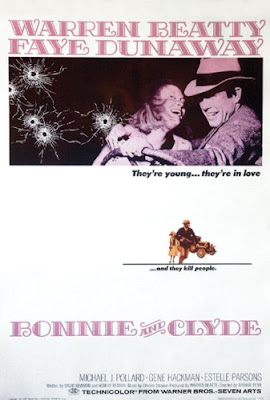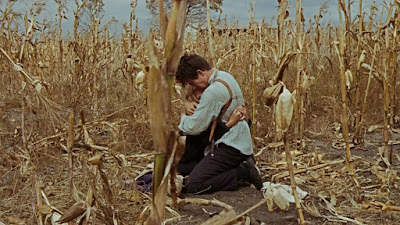Saturday 9 February 2019
L'Eclisse-Monica Vitti (1962)
Monica Vitti's languid beauty is what fills L'Eclisse, we wait to see her on screen. As Vittoria she is cool, bored, troubled, impetuous and intelligent. She goes from laughing to seriousness in seconds, and this creates a reality to a film that is often dream like in it's stark beauty. It is she who displays the emptiness and boredom of modern day life, the sense that there might be something better but it is unattainable in a society that is fixated on the material. The people around Vittoria are obsessed with consumerism, with wealth, in contrast Vittoria takes pleasure from the small things in life, the wind rattling a fence, people walking in the streets, photographs, things that seem to go unnoticed by the fast paced style of living adopted by her contemporaries. Stylistically Vitti is often filmed from behind, so that we see her world, but do we ever truly see her? Perhaps not, but her dissatisfaction with life, though unspoken, is certainly relatable in this day and age.
Tuesday 5 February 2019
Fragments-Marilyn Monroe
Happily as time goes by more and more people seem to be coming to the realisation that Marilyn Monroe was not a 'dumb blonde' but an incredibly intelligent, aware and sensitive woman. The tragedy is that for so long Marilyn has been viewed as being the archetypical sex goddess and few have realised the depth of her knowledge and interests. A quick google search of the books she owned and read gives up a phenomenal and impressive reading list that puts the most avid bookworm to shame.
She is at her most fascinating and raw in the 2010 book, Fragments.
As the title suggests Fragments is a collection of fragmentary pieces, letters, poems, diary entries and self analysis written by Marilyn over the duration of her adult life. The subject matter ranges from her thoughts on her childhood, marriage, career, emotions and dreams. She is sensitive, self aware, melancholic and sometimes humorous. I cannot think of a better book to read in order to know the real Marilyn.
Here is an excerpt from one of her poems that I found particularly beautiful and haunting:
And the silence is alone
except for the thunderous rumbling of things unknown
distant drums very present
but for the peircing of screams
and the whispers of things
sharp sounds and then suddenly hushed
to moans beyond sadness-terror beyond fear
The cry of things dim and too young to be known yet
The sobs of life itself
p. 73
Sunday 3 February 2019
Bonnie and Clyde (1967)
Arthur Penn's infamous Bonnie and Clyde (1967) is based on the true story of bank robbers Clyde Barrow (Warren Beatty) and Bonnie Parker (Faye Dunaway). Together they form a gang that terrorises America, robbing and shooting their way to an inevitable but brutal end.
The most arresting character is Dunaway's Bonnie. She's flirtatious, impetuous, intelligent, nervy and loyal. Bonnie is also the most complex character, from the moment the audience is introduced to her we sense her boredom with life, her agitation and her frustrated sensuality.
As the film progresses Bonnie's apparent over exuberance and risk taking behaviour make way for someone intensely frustrated with her position in life. Bonnie is tired of her narrow world, tired of being poor, tired of being a waitress. More than any of the other characters it is Bonnie that the audience sympathises with when she is subjected to the noise and hysteria of Buck (Gene Hackman) and Blanche (Estelle Parsons). And it is Bonnie who rightly sees the dangers of having the screaming Blanche as part of the gang.
There is a jekyll and hyde element to Bonnie. On the one hand she is intelligent and deep thinking, writing poetry, patient with Clyde's apparent impotency and perceptive. On the other she is flighty, reckless and seems to have limited moral boundaries. Or perhaps she is just blinded by love. Whilst Bonnie participates in the robberies and brandishes a gun, she is also a lost girl who longs for her mother and is hurt by her mother's perception that it will all 'go wrong'. Initially the excitement of being on the run sustains Bonnie, but later she asks Clyde what he would do if they could start over, be 'clean'. His admittance that he would continue robbing banks, just not in the same state, seems to dissatisfy her.
There is an intense feeling of claustrophobia in Bonnie and Clyde. Each time Bonnie screams out in frustration over the close living quarters, shared with Buck and Blanche, the audience wants to scream their agreement. Much of the film is spent with five people squashed into cars of varying sizes. There is no room to breathe, no room to move. In contrast, when they are alone, Clyde and Bonnie frequent wide open spaces.
If Bonnie and Clyde exhibit a sort of dangerous glamour, it is a false one, that distances them from the reality of what their lives would be like without crime-what the lives of every other American is like. Set in the Great Depression, opportunities are limited for everyone, and in a sequence that could be straight out of The Grapes of Wrath the criminals come across a family camped by the side of the road with everything they own piled on top of their car. This is a tale of the American dream gone wrong, in part because there was no feasibility of the dream to begin with. A story of the immorality of youth, coupled with the dark underbelly of America's obsession with guns-both from the criminal point of view and from that of the law.
4/5
The most arresting character is Dunaway's Bonnie. She's flirtatious, impetuous, intelligent, nervy and loyal. Bonnie is also the most complex character, from the moment the audience is introduced to her we sense her boredom with life, her agitation and her frustrated sensuality.
As the film progresses Bonnie's apparent over exuberance and risk taking behaviour make way for someone intensely frustrated with her position in life. Bonnie is tired of her narrow world, tired of being poor, tired of being a waitress. More than any of the other characters it is Bonnie that the audience sympathises with when she is subjected to the noise and hysteria of Buck (Gene Hackman) and Blanche (Estelle Parsons). And it is Bonnie who rightly sees the dangers of having the screaming Blanche as part of the gang.
There is a jekyll and hyde element to Bonnie. On the one hand she is intelligent and deep thinking, writing poetry, patient with Clyde's apparent impotency and perceptive. On the other she is flighty, reckless and seems to have limited moral boundaries. Or perhaps she is just blinded by love. Whilst Bonnie participates in the robberies and brandishes a gun, she is also a lost girl who longs for her mother and is hurt by her mother's perception that it will all 'go wrong'. Initially the excitement of being on the run sustains Bonnie, but later she asks Clyde what he would do if they could start over, be 'clean'. His admittance that he would continue robbing banks, just not in the same state, seems to dissatisfy her.
4/5
Subscribe to:
Posts (Atom)
















